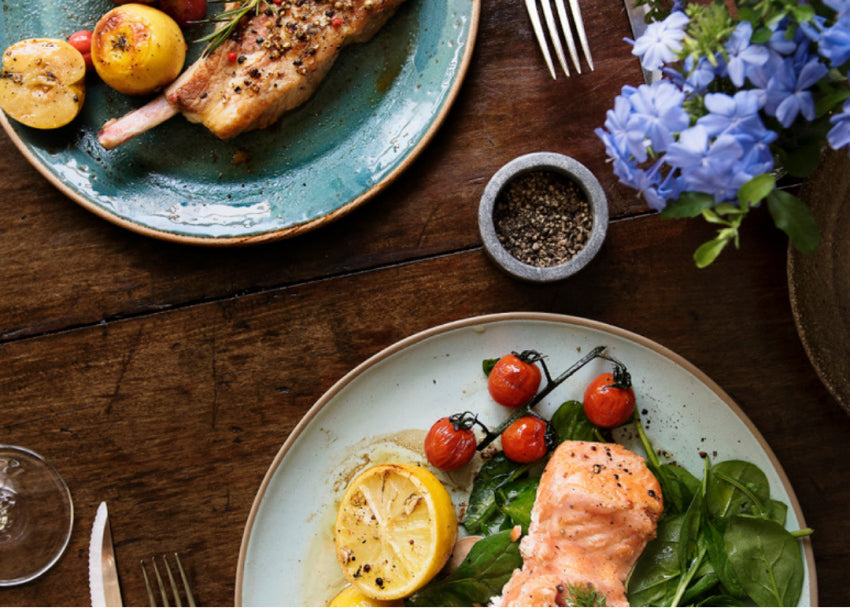Let’s face it: the phrase “doing all the things” was probably coined about our hormones. These superstar chemical messengers are responsible for so much of our bodies’ functions, including mood, libido, reproduction, growth, weight, energy, appetite, stress, and digestion. With all of that at stake, it is clear that maintaining balanced hormones is of the utmost importance for well-being. But did you know that a healthy diet can help keep hormones working as they should? Following a balanced diet, in turn, balances hormones — a win-win for our bodies.
Why Balanced Hormones Matter
Your hormones constantly fight to stay in balance. But, because so many things can negatively affect them, imbalances happen easily, leading to signaling interruptions or your body producing too much or not enough of the hormones it needs. This causes the following adverse effects.
- Weight changes
- Infertility
- Fatigue and disrupted sleep
- Vaginal dryness in women
- Irregular or heavy periods
- Constipation and diarrhea
- Headaches
- Mood swings
The good news is that following a healthy diet can help your hormones maintain balance.
Your Hormones Are What You Eat
It is important to be aware of how much you consume the foods that may throw your hormones out of whack.
Alcohol
Alcohol consumption interferes with the sources of glucose and increases cortisol production. Alcohol consumption can also cause:
- Sperm structure changes
- Impaired sexual activity
- Enlarged male breasts
- Decreased testosterone
- Thyroid problems
- Immune deficiencies
Caffeine
Similar to alcohol, indulging in caffeine leads to increased cortisol production. When cortisol levels rise, your sympathetic nervous system triggers, slowing digestion and other functions so you can engage in the biological “fight or flight” instinct. Unfortunately, elevated cortisol levels also lead to fat and carbohydrate storage, insulin resistance, increased visceral fat, and decreased thyroid-stimulating and sex hormones production.
Carbohydrates
Eating carbohydrates increases serotonin, the “feel-good” hormone. In turn, you naturally want more of what made you feel that way, and this biological impact is why we reach for carbs when we are stressed or upset.
The problem is that increased cortisol from carbs causes sleep disruptions, concentration issues, and increased belly fat. Similarly, carbs can affect your thyroid, causing fatigue weight changes, and sex hormone imbalance.
Dairy
Many people have a hard time digesting dairy, leading to gut inflammation and bowel issues. Milk and other dairy contain insulin-like Growth Hormone 1, which increases androgen hormones like testosterone and can lead to testosterone dominance. Even worse, excessive milk consumption can increase sebum production, causing oily skin and acne.
Sugar
While our bodies need some sugar to function, eating a high-sugar diet spikes insulin levels and suppresses the production of leptin, the fullness hormone, and ghrelin, the hunger hormone. As with gluten, sugar causes inflammation and puts undue stress on the adrenal glands. Not only is sugar difficult for your body to digest, but it can also cause imbalances in estrogen, testosterone, and progesterone levels.
Hormone Helping Hints
Now that you know what foods to limit, you probably wonder what you should eat to help your hormones stay as balanced as possible.
Cruciferous Vegetables
Broccoli helps estrogen balance and its glucosinolates reduce estrogen cancer risks. Its calcium can temper some of PMS symptoms, and it prevents estrogen dominance through its ability to metabolize excess estrogen. Cauliflower, Brussels sprouts, spinach, turnips, radishes, and cabbage have the same positive effects.
Fruits
Pomegranates contain antioxidants that control excess estrogen production. Apples are another healthy option, as their quercetin antioxidant makeup helps prevent inflammation and high blood pressure.
Berries also help balance hormones, as their vitamin C helps regulate progesterone, and their polyphenols are antioxidants that help prevent cellular stress, decrease inflammation, and control cortisol production.
Healthy Fats
Your body’s fat production aids in hormone balance and there are multiple ways to give your body the healthy fats it craves, including adding essential fatty acids (EFAs) such as omegas 3 and 6 to your diet. Some sources of EFAs include walnuts, soybeans, wild-caught salmon, and eggs. Avocados are one such superstar food, as their beta-sitosterol helps manage the stress hormone, increases testosterone, reduces estrogen absorbance, lowers bad cholesterol, and raises good cholesterol.
Protein
Protein provides structural support for hormone development and message communication to your body’s systems. Not eating enough protein has been shown to decrease growth hormone, prolactin, and estrogen production while causing thyroid imbalance and increased cortisol. Eating enough protein, on the other hand, positively influences hunger and satiety hormones. Eating a proper amount of organic chicken and grass-fed beef are two easy ways to get enough protein in your diet.
Seeds
Seeds such as flaxseeds are a beneficial component to a healthy diet due to their antioxidant, healthy fat, and fiber richness. Quinoa is another antioxidant, anti-inflammatory option. Technically a seed but eaten like a grain, quinoa helps control insulin, androgen levels, and blood sugar.
